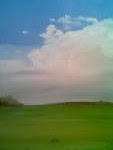 |
| Western Black African Rhino....now Extinct. |
"Extinction is a natural process - the current rate of extinction is not."

Now, there are other Rhino populations - the White Rhino, the Indian Rhino the Javan Rhino and the Sumatran Rhino. About 275 Sumatran rhinos are believed to remain.and as of 2009, only 40 Javan
Rhinos remain in Ujung Kulon Conservation, Java, Indonesia.The Camaroon subspecies of Black Rhino was declared extinct 2 years two years ago, and 3 other subspecies remained critically threatened. But now the Black Rhino is totally gone. And it is gone because of poaching...its horn believed to be of medicinal value in some Asiatic countries, Rhinos have been slaughtered for years, with increasing clashes between the conservationists, the game wardens and the poachers, some of which have turned ugly and fatal.
Greed is the ultimate bottom line - Rhino horns fetch incredible prices on the black market; an average sized horn can bring in as much as a quarter of a million dollars. Countries in which traffic for the horns runs high, have made it illegal, and are assisting conservationists and game wardens, but nothing appears to be slowing poaching down in the slightest. And even the game wardens have turned for money and aided the poachers, which contributed to the loss of the rhino.
This did not happen slowly over time as natural extinction processes occurred. This occurred abruptly, brutally and for nothing but human greed and cruelty. And the Rhino is scarcely alone in being threatened or having gone down to death....
Go back and read that again. Slowly. "Extinction is a natural process - the current rate of extinction is not."
A definition of extinction reads as follows:
A definition of extinction reads as follows:
A species becomes extinct when the last existing member dies. Extinction therefore becomes a certainty when there are no surviving individuals that are able to reproduce and create a new generation. A species may become functionally extinct when only a handful of individuals survive, which cannot reproduce due to poor health, age, sparse distribution over a large range, a lack of individuals of both sexes (in sexually reproducing species), or other reasons.
Extinctions occur for numerous reasons - Genetic pollution wherein breeding is affected by inbreeding, cross breeding and colliding with species that are more numerous, or simply dropping below a sustainable amount for a breeding population. Then there is co-extinction, when the loss of one species negatively affects a co-existing species that is dependent on the interaction of their habits and life cycles. Then there is habitat degradation, predation, competition and disease. And of course we are all familiar with "Mass extinction", so well known from the ending of the dinosaurs due to a comet strike that changed the earths climate on a wide scale. However, the rate of extinctions has been climbing at an alarming rate since the beginning of the 1900's...

This past Thursday,
April 25th, conservationists announced
the extinction of the West Black African Rhinoceros.
Now, there are other Rhino populations - the White Rhino, the Indian Rhino the Javan Rhino and the Sumatran Rhino. About 275 Sumatran rhinos are believed to remain.and as of 2009, only 40 Javan
 |
| Poaching for their horns has contributed overwhelmingly to the loss and extinction of the Rhino |
In other words...we did this.
Us.
Humans.
the Irish Elk,
the Yangtze River Dolphin,
the Quagga,
the Japanese Honshu Wolf,
the Great Auk,
the Pinta Island Tortoise (the last of whom died last year)
Stellar's Sea Cow,
Moa and the Hastian's Eagle
(the Moa's hunted to extinction by man, the Hastian's Eagle died out because of the loss of the Moa, its primary food source.)
The Thaylacine
The Carolina Parakeet.
The Passenger Pigeon.
The Dodo.
The Dutch Alcon Blue Butterfly.
The Round Island Burrowing Boa Constrictor.
The Spix's Macaw.
The Javan Tiger.
The Pyrenean Ibex.
The Tecopa Pupfish.
The Madeiran Large White Butterfly.
The Zanzibar Leopard.
The Golden Toad.
And on...and on...and on....
And on.
And every single one above went down because of man...our greed, our consumption of habitat, our poaching, our total lack of concern for this world we stand in stewardship to...whether to God, or the Gods, or simply to our higher human conscience if we do not believe in a Deity.
We have saved some. The White Rhinoceros, one of the remaining species of Rhino, has an estimated population of 20,000 in the wild. But it will also be hunted by poachers still more as the over all population of the Rhinoceros declines.
Przewalski's Horse is a rare and endangered subspecies of wild horse native to the steppes of Mongolia. At one time it was considered extinct in the wild (the last wild Przewalski's horses had been seen in 1966). Through careful breeding of the only 9 remaining Przewalski's horses in the world in captivity. It has since been reintroduced to its native habitat in Mongolia at the Khustain Nuruu National Park, Takhin Tal Nature Reserve, and Khomiin Tal. Maybe, if there are any captive Black Rhinoceros anywhere, something may yet be saved. Also, though cloning has not had a high success rate, still it may be possible to redeem an extinct species at some point through the processes of cloning. Until then however..
At this moment however, one of the last of the great giants of the animal kingdom - a holdover descendant of the giant mammals that used to walk the earth before the last ice age is gone and has passed from us. Remember. Do not forget. And give every thing you can to conservation efforts. To saving what remains before we lose any more, before any more drop below unsustainable breeding levels. Before our destruction of the biosphere brings about the destruction of all, ourselves included.
Remember forever the Black Rhinoceros.
And use that memory to effect change!


.jpg)


_specimen,_Kelvingrove,_Glasgow_-_geograph.org.uk_-_1108249.jpg)


































































That rate of extinction chart is shocking. Combination of human population explosion and advancing technology that allows humans to change the earth/habitat too easily?
ReplyDeleteActually, taken as a whole - and I mean factoring every species that ever lived within the time continuum of this planet, it is estimated that over 99.9% of all species that ever lived are extinct. Whats alarming, as you pointed out, is that shocking steep climb on that graph of extinction in the past hundred or so years. And I think you've hit on it...not so much the population, though we are living longer and more populous these days - the real issue is the advancement of technology. Before our damage to the environment was largely localized. And make no mistake, early man wasn't particularly conservationist despite romantic depictions of us living in harmony with life back then - there are evidences of slash and burn farming in the earliest know settlements. But our effect was profound limited and localized while we were using muscle power and hand tools. When we took it up to bulldozers, chemicals, dynamite and so on, the effects combined with greed become appalling.
DeleteArgh. Disregard typos please...
DeleteI grieve with you...if we are not careful, we should also become extinct. Perhaps there would be some justice in that.
ReplyDeleteThat's really one of the unspoken thoughts at the bottom of this isn't it. Aside from the utter moral bankruptcy of the destruction, rape and murder of the biosphere, the fact is we can take ourselves right out with it, if we don't reverse ourselves damn quickly! And yes, I can see justice in that, bitter as it is. Its not about saving the earth - the earth will be right here spinning until the death of the sun. But will we be on it as a species? Possibly not.
Delete